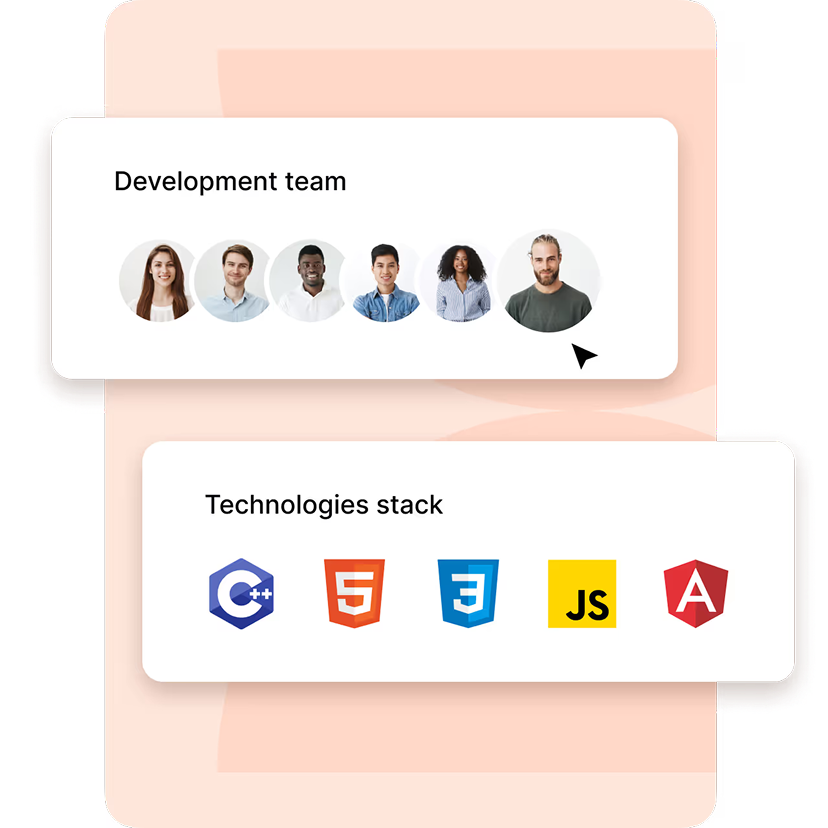Hire Back-end Developers
Get a personalized demo now.webp)









Backend developers are crucial to the success of web and software applications, responsible for numerous essential tasks. They design and manage databases to store, retrieve, and manipulate data efficiently. Additionally, they optimize server performance, ensuring that the server-side code runs swiftly and maintains responsiveness, even under heavy user loads. Early web applications were often static HTML pages, but as user demands grew, there arose a need for server-side scripting and database connectivity. This led to the development of technologies like PHP, Perl, and early versions of Java for server-side scripting. Over time, more robust backend frameworks and programming languages, such as Ruby on Rails, Python with Django, and Node.js, emerged to support the development of complex web applications.
A Back-end Developer is a software engineer who specializes in building and maintaining the server-side logic, databases, and APIs that power web and enterprise applications. Their core responsibilities include managing data flow, implementing business logic, and ensuring secure, scalable, and efficient application performance.
Back-end developers bring a range of technical capabilities to your organization.
- Design and implement scalable APIs for seamless data exchange.
- Integrate and manage databases to ensure reliable data storage and retrieval.
- Optimize server performance for high availability and fast response times.
- Enforce security protocols to protect sensitive business and user data.
- Collaborate with front-end teams to deliver cohesive user experiences.
- Automate deployment and monitoring processes for continuous delivery.

Backend developers play a crucial role in delivering robust, secure, and feature-rich digital solutions. Streaming platforms such as Netflix, Spotify, and YouTube need backend developers to ensure high availability and scalability for delivering content to millions of users. Platforms like Facebook, Twitter, and Instagram need backend developers to implement complex algorithms for user interactions, content recommendation, and real-time messaging. Tech giants like Google, Amazon, and Microsoft hire backend developers to build and maintain their cloud services, data centers, and various software applications.
Java, Python, or Ruby
Build robust backend systems using Java's enterprise performance, Python's rapid development capabilities, or Ruby's elegant syntax, creating scalable server-side applications for modern web solutions.
Database Management
Design and optimize relational and NoSQL databases using MySQL, PostgreSQL, MongoDB, implementing efficient data architectures and query optimization for high-performance applications.
Server Management
Configure and maintain Linux/Unix servers, managing deployments and system resources while implementing monitoring solutions that ensure optimal performance and reliability.
API Development
Design RESTful and GraphQL APIs with proper authentication and documentation, creating secure, scalable integration points for web and mobile applications.
Web Frameworks
Utilize Spring Boot, Django, Flask, or Rails to accelerate development, leveraging built-in components and patterns for creating maintainable web applications.
Security Practices
Implement encryption, authentication, and vulnerability assessments, creating comprehensive security measures that protect applications and data from cyber threats.
Cloud Services
Deploy applications on AWS, Google Cloud, or Azure using containerization and serverless computing, building scalable, cost-effective cloud-native infrastructure.
Job titles
Database Administrator (DBA)
API Developer
DevOps Engineer
Security Engineer
Systems Architect
Performance Engineer
Data Engineer
Utilize LinkedIn's advanced search filters to narrow down your search. You can filter by location, current company, industry, skills, and more. Use relevant keywords and skills associated with backend development in your search. This could include languages like Python, Java, Node.js, databases like MySQL or MongoDB, and frameworks like Django or Spring. Explore job postings on LinkedIn to find backend developers who may be actively seeking new opportunities. You can directly reach out to them or, in some cases, find a link to their full profile.
Pay attention to recommendations and endorsements on profiles. Positive recommendations from colleagues or supervisors can provide insights into a developer's skills and work ethic. Learn and use Boolean search operators to create more specific and targeted searches. This can help you refine your search results and find developers with the exact skills and experience you're looking for. For example, "Backend Developer -PHP" will find profiles mentioning "Backend Developer" but excludes those with "PHP" skills.
Connect with recruiters or talent acquisition professionals specializing in technology. They often share job opportunities and can help you identify suitable backend developers. One of the most popular LinkedIn communities where you can hire backend developers is Full Stack Developer Community with over seventeen thousand members. With such a large pool of talent developers, the process of hiring a Backend developer gets a little easier.
Online job boards
To hire a backend developer, you can post job openings on Indeed, LinkedIn, Naukri, Glassdoor, and Stack Overflow Jobs. These platforms have a talent pool of exceptional developers and thus will help you hire Backend developer who is well suited for your organization.
Developer communities and forums
Engage with Backend developers on platforms like GitHub, Stack Overflow, and other related forums. A lot of developers share their project updates, and constantly push codes on these platforms. In order to hire Backend developer, you can easily review their work and list the developers whose skills aligns with your project requirement.
Tech conferences and meetups
Attend Backend development and related events to network with talented developers. Search for the upcoming regional or global Backend developer conferences online.
HackerEarth hiring challenges
Sponsor online coding challenges to find competitive developers. For instance, Impact Analytics collaborated with HackerEarth to run the Backend Developer Hiring challenge in 2022, to hire Backend developer with 2-6 years of experience.
Open source communities
Engage with active contributors in Backend-related open-source projects. It can help you find good Backend developer portfolios. These communities have a lot of projects that you can review and also interact with the contributers. Therefore, to hire Backend developer, you can list the candidates whose skillset aligns with your project requirements.
Online learning platforms
Connect with Backend development enthusiasts on online learning platforms like Udemy and Coursera. These platforms have forums and job boards that you can use to find good developers.
Local universities and coding boot camps
Collaborate with local academies and educational institutions to find aspiring Backend developers.
Social media channels
Use platforms like Twitter, LinkedIn, and Facebook to share projects and job openings. Engage with Backend developer communities such as dev.to community.
Referrals and employee networks
Promote employee referrals and leverage existing networks to gather recommendations.
Hire top tech talent withour recruitment platform
Access Free Demo👍 Pro tip
Reddit is a great place to look for various Backend development-related communities, including r/webdev, r/flaskandreact, r/backend, r/programming, etc. You can also join related Communities on Discord with thousands of members.
To hire a Backend Developer, the most common assessment framework on HackerEarth includes
A combination of technical evaluations, coding exercises, and behavioral assessments. Here are some common components of the assessment framework:
Code completion tasks
While preparing the backend developer hiring assessment you should include relevant programming questions. Code completion tasks are valuable assessments for backend developers as they focus on the candidate's proficiency in writing accurate and well-structured code. Additionally, code completion tasks help assess their ability to work within the specific framework or technology stack your organization uses.
Multiple-choice questions (MCQs)
A good way to assess a developer's technical knowledge of backend development concepts, language features, and best practices is through MCQs. They can help in evaluating a developer's understanding of fundamentals. Therefore, in your backend developer interview assessment, you can include questions from database management, API design, security protocols, or server-side optimization.
Project-specific questions
During the backend developer hiring assessment, you can also include project-specific questions to assess a candidate's knowledge. It can vary depending on your requirements. Essential topics to cover include database management, API design, scalability, security measures, relevant frameworks and tools, error handling, and DevOps practices. These questions will help you hire Backend developer who can create well-structured APIs, ensure system scalability and performance, and manage deployment and infrastructure relevant to your organization's tech stack.
Language-specific questions
Asking very basic and technical questions can also help assess the candidate’s knowledge and skill sets. If your organization's stack involves Node.js, delve into their understanding of event-driven programming, Express.js for building APIs, and packages like Mongoose for MongoDB interaction. If you're using Python and Django, inquire about their knowledge of Django's ORM (Object-Relational Mapping), view functions, middleware, and Django REST framework for API development. Language-specific questions will assist in the process to hire backend developer who is well-versed in the tools and technologies your organization relies.
Our bias-free, objective platform has facilitated 1,00,000+ assessments per month
Get a personalized demo nowCode completion task
- Implement a user authentication system where users can sign up, log in, and reset their passwords.
- Design a RESTful API for a simple task management system. Users should be able to create, read, update, and delete tasks.
- Create a search and filter functionality for a list of products, articles, or any dataset.
- Build a real-time chat application that supports one-on-one or group chats.
- Create a task scheduling system where users can schedule tasks or reminders.
Multiple-Choice Questions (MCQs)
- When should you use a 404 HTTP status code in an API response?
- When a resource is created successfully
- When a resource is updated
- When a resource is not found
- When a resource is deleted
- In a cloud-based deployment scenario, what service is commonly used to store and retrieve data over the internet?
- VPN (Virtual Private Network)
- SaaS (Software as a Service)
- CDN (Content Delivery Network)
- BaaS (Backend as a Service)
- Which of the following authentication methods is based on a token that expires after a certain duration or specific conditions are met?
- OAuth
- Basic Authentication
- Digest Authentication
- API Key Authentication
Questions related to Database Management
- Explain the concepts of database normalization and denormalization.
- What is a primary key, and why is it important in a relational database?
- How can you optimize a slow SQL query?
- Describe the process of migrating data from one database system to another.
- How do you secure a database against unauthorized access and data breaches?
API Design questions
- Explain the key principles of REST (Representational State Transfer) and how they apply to API design.
- How do you choose resource names (URL endpoints) in an API?
- How do you handle API versioning to ensure backward compatibility with existing clients?
- Describe the methods for implementing authentication and authorization in an API.
- How important is API documentation, and what tools or formats would you use for documenting an API?
👍 Pro tip
These sample questions provided here are for interviewing early-experience talents. For more customized assessments for candidates with higher experience, you can contact our team at contact@hackerearth.com or request a demo here.
Job title
A backend developer job description must have a clear and concise job title that reflects the role, such as "API Developer", "Security Engineer", and "Data Engineer". Clearly describing the job role will help you attract right candidates. And thus help you hire backend developer with the right skillset.
Job summary
While preparing the backend developer job description, another important thing to add is a brief overview of the position, focusing on the essential responsibilities and objectives. Describe the main aspects of the role and how it contributes to the company's goals. Highlighting these key points are crucial in the process of hiring a backend developer who best fits your organization.
Responsibilities
Outline the specific tasks and responsibilities that the Backend developer will be expected to handle. This may include:
- Develop and maintain server-side components, including APIs and database interactions.
- Implement and optimize database schemas, queries, and data storage solutions.
- Design and document RESTful APIs, ensuring scalability and efficient data transfer.
- Handle authentication and authorization mechanisms, securing sensitive data and user access.
- Collaborate with front-end developers to integrate server-side logic with user interfaces.
- Implement caching strategies to improve application performance and reduce database load.
Including these points according to your project needs will help you find a backend developer who matches your requirements.
Back-End Developer skills and qualifications
List the essential backend developer skills and qualifications that candidates must possess, including, but not restricted to:
- Proficiency in backend programming languages such as Python, Java, Node.js, or Ruby.
- Strong understanding of database management, including SQL and NoSQL databases.
- Experience with RESTful API design and implementation.
- Familiarity with server-side frameworks and libraries relevant to the tech stack.
- Ability to secure data and applications, protecting against common web vulnerabilities.
- Problem-solving skills to optimize server performance and handle data-related challenges.
Preferred skills
There are some backend developer skills crucial for a specific role. Therefore, while preparing for a backend developer job description, you can mention these additional skills or qualifications that would be beneficial but not mandatory for the role. For example, experience with CI/CD pipelines for automated testing and deployment. You can also ask for experience with specific tools, libraries, or frameworks.
Education and experience
Specify the educational background and professional experience required for the position. This could range from a bachelor's degree in computer science or a related field to several years of relevant experience.
Company culture and EVPs
Briefly highlight your company's culture, values, and any unique perks or benefits offered to employees that can help attract candidates who align with your company's ethos.
Application instructions
Provide instructions on how candidates can apply for the position. Include where to send their resume, portfolio, or other required documents. Also, specify the deadline for applications, if applicable.
Equal Opportunity Statement
Include a statement affirming that your company is an equal opportunity employer committed to diversity and inclusion.
Skill-first hiring requires that the developer interview process be designed to understand the candidate’s skill and experience in the given domain. You can consider the following guidelines when conducting a face-to-face interview with a Backend developer:
Conduct a real-time technical assessment
Usually candidates are given a remote assessment before the interview. However, a real-time assessment provides valuable insights into a candidate's coding proficiency, problem-solving approach, and how well they perform under time constraints. During the backend developer interview assessment, evaluate their ability to design and implement efficient and scalable solutions, taking into account factors such as data structures, algorithms, and database interactions. Additionally, assess their debugging skills, code readability, and adherence to best practices. Incorporate questions that gauge their understanding of system architecture, API design, and security considerations.
FaceCode is HackerEarth’s flagship tech interview platform with a built-in question library you can use to test the candidate’s knowledge of Backend development concepts they claim to be familiar with. The built-in IDE environment can be used for assessing their ability to write clean, efficient, and maintainable code. You can also use the pair-programming method to observe their problem-solving approach, logical thinking, and attention to detail.
Learn how Facecode can make tech interviews easier
Understand the candidate’s project experience and review the portfolio
During the backend developer interview assessment, explore the candidate's past and present projects. To understand a backend developer's project experience and review their portfolio, carefully examine the projects listed on their resume and the code repositories within their portfolio. Focus on the scale and complexity of the projects, paying attention to the technologies, frameworks, and databases utilized.
Evaluate the developer's role in each project. Ask if they were involved in system architecture, database design, or optimization efforts. Examine the codebase for readability, documentation, and adherence to coding standards. By delving into their project experience and portfolio, you can gain insights into their technical proficiency, problem-solving skills, and the depth of their backend development expertise.
Understand if they are a good culture and team fit
To assess if a backend developer is a good culture and team fit, engage in conversations that delve beyond technical skills. Inquire about their experiences collaborating with cross-functional teams and their communication style within group projects. Assess their adaptability and willingness to share knowledge, as these qualities contribute to a positive team dynamic.
Ask about their approach to problem-solving in a team setting and how they handle feedback. Understanding their perspective on teamwork, company values, and work culture helps ensure alignment with the broader team ethos. Additionally, seek examples of how they've contributed to a collaborative work environment in the past.
United States
Back-end Developers in the U.S. enjoy competitive salaries, particularly in tech hubs like San Francisco, New York, and Austin. Salaries vary based on experience, location, and company size.
- Average Annual Salary: $150,260 per year
- Entry-Level: $97,766–$121,000 per year
- Mid-Level: $120,000–$140,000 per year
- Senior-Level: $147,662–$180,000+ per year
United Kingdom
In the UK, back-end development is a growing field, with demand increasing in cities like London, Manchester, and Edinburgh. Salaries vary based on experience, location, and company size.
- Average Annual Salary: £59,841 per year
- Entry-Level: £45,000–£55,000 per year
- Mid-Level: £55,000–£68,400 per year
- Senior-Level: £72,500–£100,000+ per year
Australia
Australia's back-end development sector is expanding, with significant activity in Sydney, Melbourne, and Brisbane. Salaries vary based on experience, location, and company size.
- Average Annual Salary: AUD 119,163–AUD 135,000 per year
- Entry-Level: AUD 90,000–AUD 104,000 per year
- Mid-Level: AUD 105,000–AUD 125,000 per year
- Senior-Level: AUD 130,000–AUD 159,000+ per year
What qualifications should I look for in a Backend Developer?
First and foremost, you should look for candidates with a strong foundation in backend programming languages. It can be either Python, Java, or Node.js along with proficiency in database management encompassing both SQL and NoSQL systems. It's crucial that they possess hands-on experience in designing and implementing RESTful APIs, as well as the ability to ensure robust authentication and authorization mechanisms.
In addition to technical skills, a deep understanding of server-side frameworks and libraries relevant to your tech stack is essential. You should also test their problem-solving skills and knowledge of optimizing server performance.
Do we require the candidate to have experience in all the necessary tools or just one is enough?
When hiring a Backend Developer, it's typically not necessary for a candidate to have experience in all the tools and technologies used in your specific stack. Having expertise in one primary language and relevant tools is often sufficient, but adaptability and a willingness to learn are equally important.
Candidates who showcase a deep understanding of fundamental concepts, such as database management, API design, and security, can readily transition to tools within your stack. Prior experience in a similar tech ecosystem is a valuable bonus, but a candidate's ability to grasp and apply new tools efficiently is an essential quality to consider when evaluating their suitability for the role.
What are the skillsets of a API Developer?
API Developers possess a distinct skill set that revolves around designing, developing, and maintaining Application Programming Interfaces (APIs). They excel in programming languages such as Python, JavaScript, or Java and are proficient in API design, ensuring efficient data transfer and usability. API Developers also have expertise in authentication and authorization mechanisms, security measures, and documentation. They often solve problems related to creating seamless connections between software systems, enabling data exchange, integration, and communication between applications.
API Developers are integral because they facilitate the smooth exchange of data and functionality between diverse applications and platforms. By ensuring that systems can communicate effectively, they play a crucial role in modern software development, enabling businesses to stay competitive and responsive to evolving technological trends.
How to assess a candidate's real-world project-handling skills?
To assess a backend developer's real-world project-handling skills, start by asking them to walk you through their previous projects. Encourage them to provide specific examples of the challenges they faced, the strategies they employed to overcome them, and the impact of their decisions on the project's success.
Ask the candidate to outline their approach, architectural decisions, and technology choices in solving a hypothetical problem. This practical scenario will help you gauge their problem-solving abilities, ensuring they can effectively handle real-world challenges in a backend development role.
How does the requirement for backend developer skills change across various job roles?
The required skills for a Backend Developer can vary across different job roles and industries. In a startup or small company, a Backend Developer may need a broader skill set, encompassing full-stack capabilities to handle a wide range of tasks. In contrast, in a larger organization, Backend Developers may have more specialized roles, focusing on specific areas like database management, API design, or performance optimization.
For instance, an e-commerce company may require expertise in handling high volumes of transactions and ensuring data security, whereas a social media platform may emphasize real-time communication and scalability. The specific problems a Backend Developer is required to solve depend on the organization's goals and the nature of the industry, influencing the skills and experience sought in candidates.





.webp)
.webp)
.webp)
.webp)
.webp)
.webp)
.webp)

.webp)
.webp)





.webp)


.webp)












